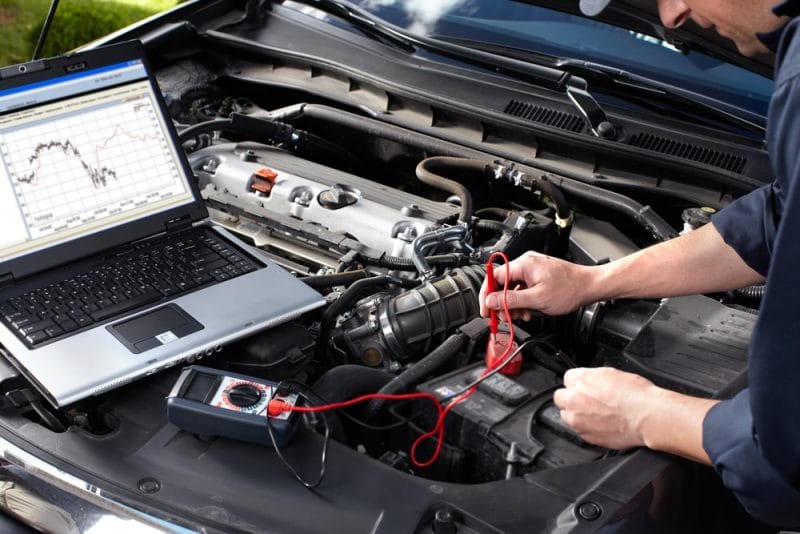Replacing vs Repairing Engine Control Modules (Updated)

If your vehicle suddenly refuses to start, and you’ve exhausted the more mundane causes such as a dead battery, it’s possible that you have a faulty ECM (engine control module) or engine computer.
The engine control module is one of the important parts of your vehicle. Some mechanics call it the “brain” of your car, and that’s not far off the mark. It controls other systems, such as the power control module, the ignition, the engine timing, and other essential engine functions. When it breaks, you need to fix the problem immediately.
We’re about to talk about how to know when it’s failing, and the costs and benefits of engine control module repair versus engine control module replacement. Let’s get started!
Symptoms of Engine Control Module Failure
Hopefully, you discovered your ECM failure because of something less catastrophic than your car totally failing to start. When an ECM fails, it may or may not trigger any form of alert. This can make troubleshooting difficult and can lead to a misdiagnosis of a non-functioning computer.
Because ECMs are an electrical part, not a mechanical part, a lot of mechanics overlook possible ECM problems altogether. This can lead to costly repairs of other engine components, with owners sinking hundreds or even thousands of dollars into their vehicle while problems continue to persist.
Besides your car failing to start, here are some other, more subtle signs that your ECM may be on the fritz:
- Your engine is stalling or misfiring. Okay, this isn’t exactly subtle. But it does indicate problems with your engine timing, which is controlled by your ECM.
- Decreased performance. If your car suddenly struggles to go up hills or accelerate down an entrance ramp, it’s possible that your ECM is to blame.
- Lowered fuel efficiency. Your ECM is partially responsible for controlling your vehicle’s fuel to air ratio. Changing this ratio will cause your gas mileage to suffer.
- Your check engine light is on. This is a weird one, since just about anything can cause your check engine light to come on. It’s worth having the code read regardless, since something is causing the light to activate.
If you suspect any of these symptoms, you should consider replacing or repairing the ECM.
The Challenges of Repairing Engine Control Modules

Repairing Engine Control Modules can be performed in a couple of ways.
The first, and easiest, way to repair an ECM is if there’s a problem with the power supply. Oftentimes, these can be repaired by a skilled mechanic or electrician, by rectifying any shorts or bad connections.
However, most ECM problems are a result of a bug in the software itself. This isn’t common. While power surges, lightning strikes, and short circuits can result in damage to the circuit board, those result in physical damage to the hardware. In those cases, the ECM needs to be replaced.
In the rare case that there is a problem with your ECM’s software, you can potentially fix the issue by “flashing” the firmware to reset it to factory specifications. If you’re working on your own, this is a risky proposition. Specific vehicles and specific ECMs require specific software, most of which isn’t readily available.
Basically, unless it’s a simple power supply issue, ECMs are challenging to repair.
Replace Your ECM to Save Time and Stress
Engine control modules aren’t designed to be repaired by the average car owner. While some shops, like Solo PCMs, specialize in engine control module repair, these shops know which ECMs can be safely flashed or refurbished, and which ones need to be replaced altogether.
Unless a qualified mechanic tells you otherwise, the best choice is almost always to replace your ECM.
Where do I Begin if I Want to Replace My Car’s ECM?

Mechanically speaking, replacing your ECM is relatively simple. However, it’s an expensive part, and it needs to be paired with the correct vehicle in order to function correctly. As a result, the first step is to ensure that your ECM is in fact the problem.
There are other parts which could be failing and causing your ECM to work improperly.
The most obvious is the wiring harness. If there’s a short in your wiring, it can cause your ECM to fail, or to get a bad reading from one or more of its sensors. Checking every wire on your wiring harness can be a headache, but it’s far more affordable than replacing your ECM outright.
Beyond the wiring harness, it’s a good idea to check the inputs and outputs on connected devices, as well as the fuses for those connected devices. Check the inputs on your battery, ignition switch, and tire sensors that are connected to the ECM. Check the outputs on your fuel injectors, fuel pump, the spark plugs, and starter.
If all of those parts are working fine, it’s confirmed: your ECM has failed.
The next step in your replacement is to find the correct ECM. Check with your manufacturer to verify the make, model, and year of your car. Have the VIN number handy, since this can be the easiest way to look up which ECM you’ll need.
Get Advice From Proven Auto Computer Experts
At Solo Auto Electronics, we reprogram all of our engine computers with the latest firmware and software updates from the manufacturer.
If a replacement is necessary, our technicians are highly trained and have the experience to ensure that your car is fitted with the best quality engine computer available to help manage your vehicle’s systems.
However, keep in mind that while you can adjust and replace your car’s engine computer in any car, you may have difficulty with replacing the complex computer systems featured in newer cars. With our years of experience with repairing engine control modules, you can rest easy knowing we’ll get the job done right.
If you are in the market for a reprogrammed or rebuilt auto computer, here at Solo PCMS, we re-manufacture auto computers for a wide range of popular makes and models, including the Ford Explorer.
Contact us online for more information, or give us a call at (800)-886-9926.




